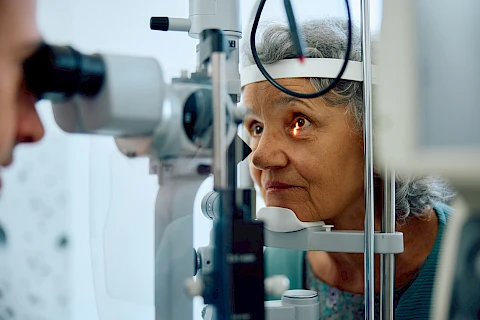
Diabetic retinopathy is a condition that affects many seniors and can have a major impact on vision if not caught early. Senior Helpers will educate seniors and their families about diabetic retinopathy, emphasizing the importance of regular eye exams, managing blood sugar levels, and recognizing early symptoms. By working closely with healthcare teams, seniors can protect their vision and continue enjoying a high quality of life.
What Is Diabetic Retinopathy?
Diabetic retinopathy is a common complication of diabetes that affects the blood vessels in the retina, the light-sensitive tissue at the back of the eye. High blood sugar levels can damage these small blood vessels, leading to vision problems or even vision loss if not managed. Diabetes affects eye health by causing changes in blood flow and increasing the risk of fluid leaks and swelling in the retina.
The Value of Regular Eye Exams
Regular eye exams are an essential tool in detecting diabetic retinopathy in seniors, potentially preventing serious vision issues down the line. For seniors with diabetes, it is generally recommended to have a comprehensive eye exam at least once a year.
These exams include dilated eye tests, which use drops to widen the pupil, allowing doctors to examine the eye’s interior. Tests can also include checking for changes in vision, eye pressure, and the health of the retina. By catching any signs of diabetic retinopathy early, seniors can take steps to protect their vision.
Managing Blood Sugar Levels
Managing blood sugar levels is important not just for overall health, but specifically for eye health as well. High blood sugar can lead to damage in the retina, so seniors need to maintain healthy blood sugar levels. Here are a few tips to help:
- Seniors should monitor their blood sugar regularly and follow their doctor's advice on managing it.
- They should also eat a balanced diet rich in fruits, vegetables, and whole grains while avoiding excessive sugars and starches.
- Lastly, seniors should engage in regular physical activity. Even something as simple as a daily walk can help maintain good blood sugar levels. However, make sure they consult a doctor before starting a new fitness routine.
Recognizing Early Symptoms
Early detection of diabetic retinopathy in seniors can greatly improve outcomes. Be aware of common symptoms and seek medical advice promptly if you notice any changes in your loved one's vision.
These symptoms include blurry or fluctuating vision, dark spots or floaters in sight, difficulty seeing at night, and colors appearing faded or washed out. Early detection and treatment are vital to preventing more severe vision problems.
Working With a Healthcare Team
Managing diabetic retinopathy in seniors is a team effort that involves various healthcare professionals. A primary doctor, an eye doctor, and possibly a diabetes specialist will work together to create the right treatment for seniors.
A coordinated care approach ensures that all aspects of seniors' health are being monitored. Communicate openly with doctors about any vision changes or concerns. By being proactive and involved, seniors can take significant steps in protecting their eye health.
Contact Senior Helpers for Personalized In-Home Care
By scheduling regular eye exams, managing blood sugar levels, and recognizing symptoms early, seniors are taking important steps to protect their vision. Work closely with a healthcare team for the best outcomes.
For support and resources, Senior Helpers is here to assist you and your senior loved ones through every step of maintaining good eye health. Click here to find a location near you and get the help you need.

